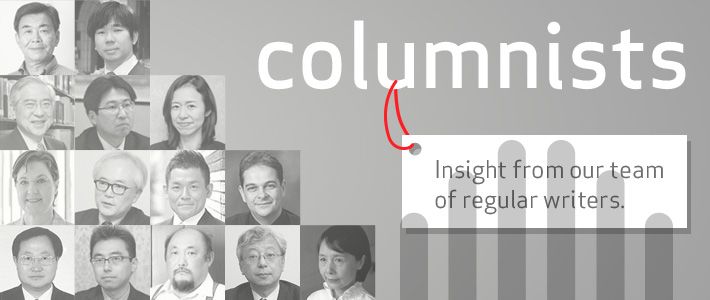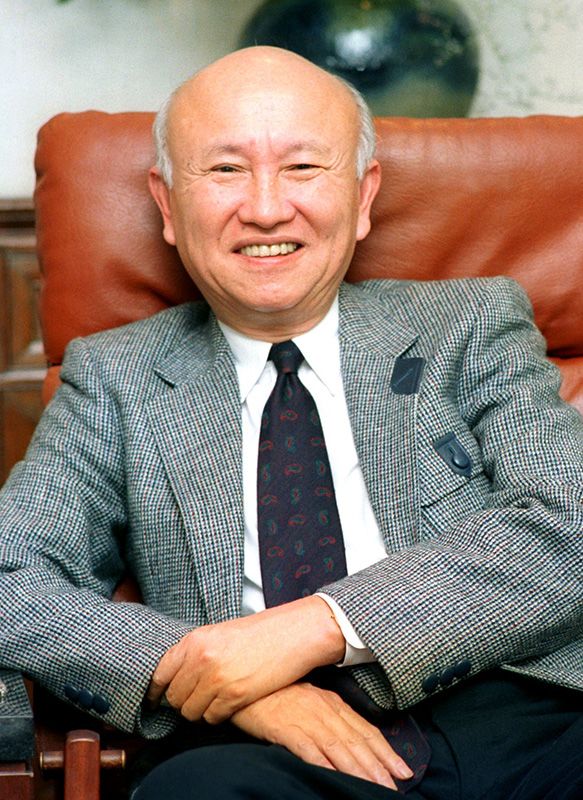
Insights from Kyū's Kitchen
Society- English
- 日本語
- 简体字
- 繁體字
- Français
- Español
- العربية
- Русский
 Kyū Eikan
Kyū Eikan
Kyū Eikan was born in Tainan in 1924 to a Taiwanese father and a Japanese mother, when Taiwan was under Japanese colonial rule. He attended high school in Taipei and graduated from the Faculty of Economics at Tokyo Imperial University. In 1946 he returned to Taiwan and took part in the independence movement before fleeing to Hong Kong to escape the Kuomintang’s crackdown. He moved to Japan in 1954 and just two years later won the Naoki Prize for his 1955 novel Honkon (Hong Kong), depicting life in exile. In the years that followed, he made a name for himself as an economic commentator and a prolific writer and speaker. He tried his hand at a number of business ventures and won a large following with his how-to books on business management and investment. But he was also known for his writings on cultural topics, especially essays on cuisine and Chinese and Japan culture.
The popular economic commentator and writer Kyū Eikan passed away on May 16. A man with extraordinary foresight and a relentlessly fast-moving intellect, he went through life like a perpetually spinning top. In addition to publishing some 450 books and articles during his lifetime, he gave around 200 talks and presentations each year, boarding some 120 flights as he whizzed between Tokyo, Taipei, Hong Kong, Shanghai, Beijing, and Chengdu.
I first met Kyū in 1983, soon after I was transferred from the book department of Chūō Kōron to the monthly magazine. Kyū was part of my editorial assignment when I took over a regular feature in which he and economic analyst Hasegawa Keitarō interviewed a notable business figure each month. As I recall, the first interview was with Korekawa Ginzō, a stock market wizard living in the resort town of Atami. Other featured guests were Daiwa Securities President Chino Yoshitoki, Fujitsu President Yamamoto Takuma, Samsung Group Chairman Lee Byung-chull—people of that ilk. Kyū usually chose the interviewee and made the initial contact as well.
That series came to an end after two years, but my professional relationship with Kyū continued long after that thanks to his involvement in other projects, from a series about the Chinese and the Japanese to an interview we did with Lee Teng-hui soon after he stepped down as president of Taiwan in 2000. Kyū was forever giving me copies of his books, and although his tips about money making were lost on me, I still have a great fondness for the first book he gave me: Kyū Hanten no menyū (The Menu at Kyū's Kitchen).(*1)
The best known of Kyū’s books on food is probably Shoku wa Kōshū ni ari (The Place for Food is Guangdong), but Kyū Hanten has a special appeal of its own. In describing the people he had to dinner and the food he served them, Kyū provides a fascinating insider's history of postwar Japanese culture and business. Kyū’s dinners feature a parade of noted literary and artistic figures whom I recall from my childhood and youth, beginning with novelists Satō Haruo and Dan Kazuo, who dined at Kyū’s in September 1954. They also feature an amazing array of mouth-watering dishes.
One of the most remarkable things is the great care Kyū took in tailoring each dinner menu to his guests, as suggested by this passage: “To serve the same meal to repeat guests would be unimaginative. Yet to serve completely different dishes might be unkind to those who come looking forward to dishes they had enjoyed last time. . . . In my experience, their pleasure doubles if you change about half the menu from the last dinner you served them.”
Although it may seem a simple strategy, it actually shows remarkable solicitude and understanding. How often are diners torn between trying some new dish they’ve never had and sticking with something tried and true? (I know I feel that way at practically every meal.) Should one go with an old favorite that is sure to please or open the door to a new experience at the risk of being disappointed? Whichever choice one makes, one always feels a bit wistful about “the road not taken.”
Kyū understood this conflict, and in his eagerness to make his dinners as enjoyable as possible for his guests, he arrived at a brilliant solution that satisfies both desires: a dinner where one can meet old “friends” while also making new acquaintances. The element of the new provides a buzz of excitement, which in turn “doubles the pleasure” of being reunited with the familiar. It occurs to me that I might do well to apply the same principle to travel—spend half of my vacation somewhere I’ve never been, and the other half in a place I’ve been longing to revisit . . . ah, but I digress.
Well, then, what new and old delicacies shall I treat myself to today?
(Originally written in Japanese on June 8, 2012.)
(*1) ^ Tokyo: Chūō Kōron Sha, 1983.